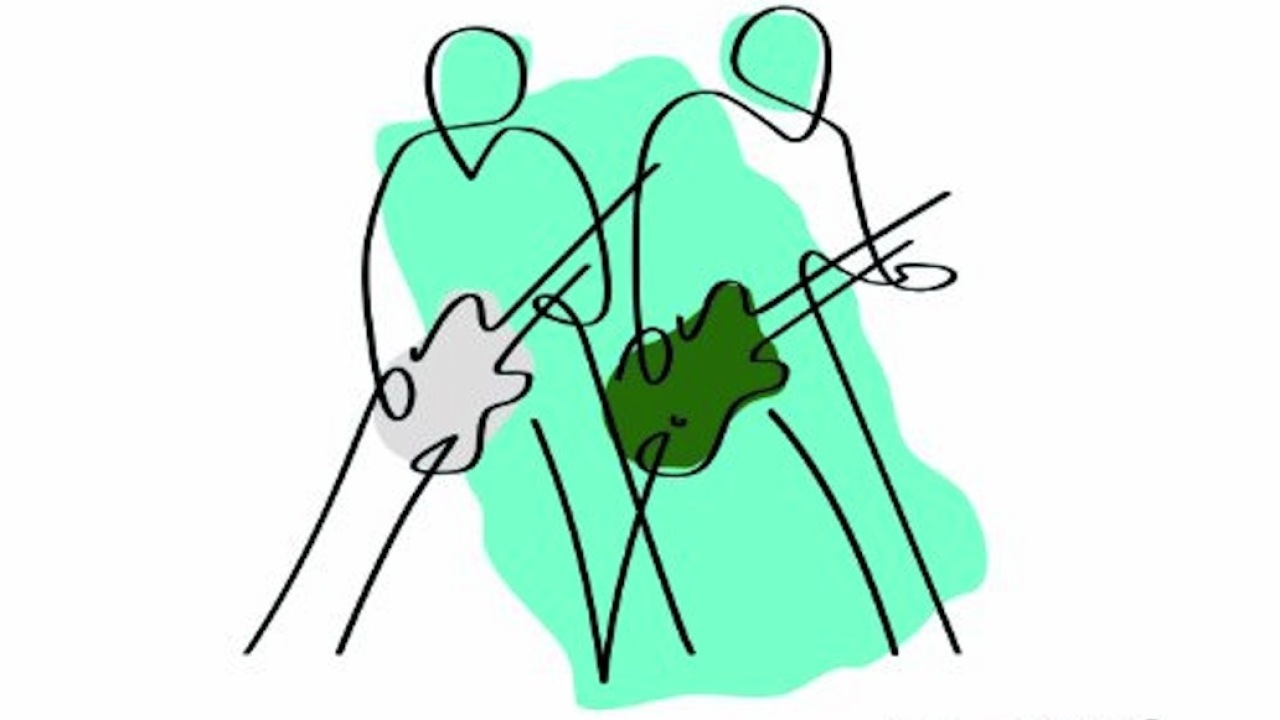Ver Kwo! What British band (this side of the Stones, that is) has remained in business for as long as they have, maintained such a loyal domestic following and simultaneously had such bottomless oceans of urine extracted from them by sneerers, sceptics and snobs?
Like their US contemporaries ZZ Top (though with flat Sahf London whines rather than gritty Tejas drawls), they’ve somehow managed to keep squeezing pop hooks out of rockaboogie basics since the late 60s. And like The Ramones, who also happily waved the ‘three-chord’ banner despite routinely using five or even six, and equally happily encouraged fans and detractors alike to misunderestimate them, they were always a lot smarter than they looked. So it is that after a hundred-odd years and 53 albums (something like, anyway), Ver Kwo are still with us, still with the same two guys at the front: Rick Parfitt’s rhythm guitar still hammering, Francis Rossi’s lead still hooky and concise.
Starting out in 1968 as purveyors of psychedelic bubblegum, aiming uneasily into a notional market gap between Traffic and Pink Floyd on the one hand and The Tremeloes and Marmalade on the other, they appeared on Top Of The Pops equally uneasily stuffed into mid-price Carnaby Street satin’n’tat (with Rossi sporting a hastily-grown bumfluff-bandido ’tache) to perform Pictures of Matchstick Men, the first and biggest of their two early hits.
Paradoxically, it was only after they stopped chasing pop success that they found it. When the hits stopped coming, they downsized into the clubs, recalibrated their musical policy along the groovalicious boogiecentric lines of Chuck Berry, Elmore James and John Lee Hooker via Rory Gallagher’s Taste, Peter Green’s Fleetwood Mac, Free and the Stones (with the odd transatlantic nod to Canned Heat and ZZ Top), acquired an audience uniformly clad in patched denim, greatcoats, dandruff and split ends, and, essentially, never looked back. Or forward. A Great British institution was born.
Their ace card was their origins as a pop group, whereas Rory Gallagher et al were fundamentally bluesmen who disdained pop as more the Devil’s work than the Robert Johnson songbook ever was. Even if the ground Quo cultivated and tilled in their denim-clad runka-dunka incarnation was the rockaboogie roll, Rossi and Parfitt still truffled for catchy pop hooks, and they found them. How long is a piece of string?
As long as Quo’s string of hits, from Down The Dustpipe (is there still no room for a kosher cowboy in a town like New Orleans?) and In My Chair through Paper Plane, Caroline, Down Down (deeper and down?), Don’t Waste My Time, Roll Over Lay Down (shouldn’t that be Lay Down Roll Over?) all the way to the classy-meets-cheesy cover-band path they began to tread in ’77 with John Fogerty’s Rockin’ All Over The World.
Their unashamed meat-and-potatoes approach may have seemed banal to those who liked things harder and heavier (Who, Zep, Sabs), weirder and glammer (Bowie, Roxy, Alice Cooper), bluesier and sleazier (the Stones, of course) or rawer and punkier (MC5, Stooges and later the Unholy Trinity of Ramones, Pistols and Clash), but Quo managed to go straight up the middle and become Beloved Entertainers par excellence.
So here we are and here we are and here they go in 2011 with yet another album (exclusively available via Tesco – and we don’t mean Nicky – for rather more than just a quid). Is it any good? In places. Any new Quo Qulassics? Not really, though it has its moments. The curtain-raiser, Rossi’s Two Way Traffic has enviable rock drive and some entertaining wordplay, as does Parfitt’s Reality Cheque (they’re still not writing together, but then they never did very much, both preferring to co-compose with the same pool of Quollaborators), and Rossi’s Dust Into Gold cheekily lifts Lord Keef’s signature guitar fills from the Stones’ Gimme Shelter. You can pretty much tell what Rossi’s Rock’n’Roll’n’You and Parfitt’s Let’s Rock sound like just by reading the titles.
Overall, Quid Pro Quo is mostly workmanlike pub-rock, slickly performed and burnished to a high production-values sheen. Quommitted fans will love it; for everybody else it’s simply more of the same served up Again Again. Some things never change: the question is whether or not they should. After all, Status Quo know what they’re doing, and for whom.
